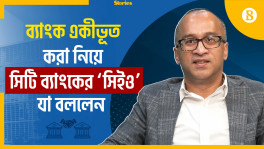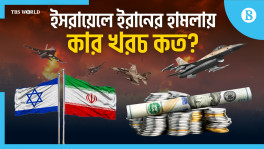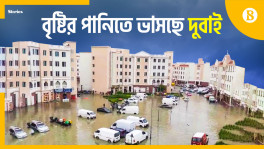‘Panir dam’ should mean priceless, not worthless
If we are to successfully meet the 6th Sustainable Development Goals (SDG) by the year 2030 – safe water and sanitation for all, we need to become more serious about valuing and conserving water

In 2008, when I returned from overseas to live and work in Bangladesh, I came across a very unfortunate expression for cheap things: "Panir dam" – which roughly translates to "cheap as water". This societal or cultural attitude has harmed our rivers, wetlands and groundwater systems significantly.
The theme for this year's WWD is Valuing Water. For a rapidly developing country like Bangladesh, this is a very important issue. If we are to successfully meet the 6th Sustainable Development Goals (SDG) by the year 2030 – safe water and sanitation for all, we need to become more serious about valuing and conserving water.
The value of water comes from its benefits to our households, health, food production, culture and religion, education, economics and the natural environment around us. When we do not properly value these benefits, we risk mismanaging this precious resource.
SDG 6's first target (6.1) is: By 2030, achieve universal and equitable access to safe and affordable drinking water for all. If we as a society do not change our attitudes towards water then there is a real risk that we will not be able to preserve this critical resource for the benefit of everyone.
This in turn will have immense social justice implications. Already, the next generation is holding us (the older generation) accountable for what we are leaving them as an inheritance on this planet.
Bangladesh already has a great track record in the water supply, sanitation and hygiene (WASH) sector, especially compared to other countries in the region. However, there is still a long way to go if we are to meet SDG Target 6.1.
In the urban areas, the water supply authorities (WASAs) have been supplying water mainly from groundwater sources for many years – Dhaka WASA manages one of the largest well fields in the world.
Now, rivers are being tapped to meet the ever-increasing demands. DWASA, Chattogram WASA, Khulna WASA and Rajshahi WASA all currently have new surface water treatment plant projects underway or in the planning stage.
To keep these investments sustainable, we need to ensure that the pollution levels in the rivers are not excessive. It is indeed very sad that even though Dhaka has six rivers around her like a garland, the pollution levels are so extreme in the summer that DWASA has to pump water from the Meghna and Padma Rivers situated 30-40 km away.
We need to learn from these mistakes and carefully manage and protect river water so that the residents of these urban centres have access to safe drinking water (SDG Target 6.1).
For the high-density urban areas, where water consumption is rapidly increasing due to migration-driven growth and improved living standards, water demand management measures are urgently required.
These measures include setting a smart tariff structure to discourage the wastage of water. A relatively low water tariff can be set for basic human needs (up to 100 litres per person per day) so that the poorer sections of our society are not disadvantaged.
Then a higher tariff can be set for increased water usage on the more affluent members of our society (for an additional 50 litres per person per day).
Finally, a third (highest) tariff can be set for commercial/industrial users as well as wasteful residential customers, who do not appreciate the true value of water.
For CWASA and KWASA, rising river salinity caused by climate change and water withdrawals from the upstream river presents another challenge. Here, technical innovation is required. Given that the country now has improved electricity capacity and the citizens and industries have an increased capacity to afford improved water supply facilities, desalination of brackish water can provide a long-term, climate change resilient solution.
This is an adaptation measure that can permanently solve water sourcing issues and reduce stress on groundwater resources. Desalination can also be an effective solution for coastal towns such as Cox's Bazar and the Special Economic Zones in the coastal areas (such as Mirsarai). The value of water is even more in these water-scarce areas.
In other urban areas (such as municipalities and city corporations) as well as rural areas, the Department of Public Health Engineering (DPHE) is mandated to provide water supply solutions.
In that regard, the DPHE has successfully implemented rural piped water supply schemes with the support of development partners. After developing and implementing the projects, the management of the infrastructures is handed over to the local authorities, such as Union Parishads or local Water Supply Scheme Committees.
Here, the challenges are not technical but more institutional in nature. The operation and maintenance of these schemes require proper management and financing. As the level of poverty decreases in rural areas, the ability and willingness to pay for a safe and reliable water supply is growing.
These local committees need to be supported by government and non-government agencies as well as the private sector to ensure that the schemes are run efficiently and water tariffs are affordable.
This can be in terms of training, capacity building and providing technical support. This joint effort will help towards changing mindsets regarding the true value of water and ensure that these schemes are financially sustainable.
Although the Covid-19 pandemic continues to take its toll on our economy and the livelihoods of many vulnerable people, the path to overcoming this challenge not only depends on vaccinations and improved public health measures but also on us as a society to value nature especially water and not take it for granted.
For example, it is not possible to have good hand hygiene without a clean and reliable water supply. I look forward to the day when "Panir dam" will refer to something priceless rather than something worthless.
Dr Asif M Zaman is an Environmental Engineer and Managing Director of Esolve Intl. Ltd as well as a part-time Associate Professor at North South University. He can be reached at [email protected]


 Keep updated, follow The Business Standard's Google news channel
Keep updated, follow The Business Standard's Google news channel
















